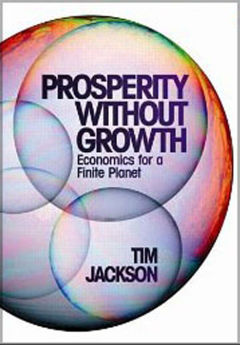Tim Jackson's new book outlines the case for a new vision of prosperity, one linked to our meaningful participation in community life.
Author: Tim Jackson
Reviewed by: David Towell
David Towell, Director of the Centre for Inclusive Futures, describes what he likes about this new book by Tim Jackson.

The central focus for the Centre for Inclusive Futures in 2012 is exploring how efforts to enhance social justice and promote inclusion can best be linked to the overarching 21st Century imperative of achieving a sustainable future, that is, which protects the biosphere and fosters well-being for all.
Tim Jackson’s 2009 book (now in paperback from Earthscan) Prosperity Without Growth: Economics for a Finite Planet is a key text for this exploration. Jackson sets out to debunk the conventional thinking which has helped get us into the current mess and start to define a credible vision of what it means for human society to flourish in the context of ecological limits. He has particular messages for ‘rich’ economies like the U.K. which are already exhausting much more than our share of the world’s natural resources.
In a persuasive and detailed analysis Jackson advances four main propositions:
Borrowing both from the small-scale example of social enterprises which employ (mostly) human resources to address community needs and the inspiration of ‘intentional communities’ like those discussed in Wheatley and Frieze’s book Walk Out, Walk On, as well as Amartya Sen’s identification of well-being in terms of our capabilities for flourishing, Jackson defines prosperity simply as a state which offers us all the ability to participate meaningfully in the life of society.
In more detail, prosperity goes beyond basic material satisfactions (still to be achieved in many ‘poorer’ countries) to emphasise instead the quality of our lives and the health and happiness of our families; the strength of our relationships and our trust in the community; our sense of shared purpose and satisfaction at work. He also shows how well-being in this sense is more easily achieved in more equal societies.
This analysis leads on to a promising sketch of the public policies required to make the transition to a better future, in three main areas:
Within this broad vision and strategy, we can develop our argument that valuing everyone in our diverse communities for the assets they bring and welcoming their inclusion is not only morally right, it is also essential to achieving this better future for us all.
The publisher is Routledge.
Prosperity Without Growth: Economics for a Finite Planet © Tim Jackson 2009.
Review of Prosperity Without Growth © David Towell 2012.
All Rights Reserved. No part of this paper may be reproduced in any form without permission from the publisher except for the quotation of brief passages in reviews.